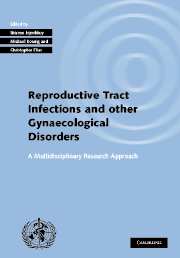 Investigating Reproductive Tract Infections and Other Gynaecological Disorders
Investigating Reproductive Tract Infections and Other Gynaecological Disorders Book contents
- Frontmatter
- Contents
- List of contributors
- Foreword by Paul F.A. Van Look
- Acknowledgements
- 1 Introduction and overview
- 2 Defining reproductive tract infections and other gynaecological morbidities
- 3 The social context of gynaecological morbidity: correlates, consequences and health seeking behaviour
- 4 Reproductive health: men's roles and men's rights
- 5 Study design for the measurement of gynaecological morbidity
- 6 Alternatives to community-based study designs for research on women's gynaecological morbidity
- 7 Community interaction in studies of gynaecological morbidity: experiences in Egypt, India and Uganda
- 8 Definitions of clinically diagnosed gynaecological morbidity resulting from reproductive tract infection
- 9 Laboratory tests for the detection of reproductive tract infections
- 10 Laboratory methods for the diagnosis of reproductive tract infections and selected conditions in population-based studies
- 11 The value of the imperfect: the contribution of interview surveys to the study of gynaecological ill health
- 12 Qualitative methods in gynaecological morbidity research
- 13 Integrating qualitative and quantitative methods in research on reproductive health
- 14 Interpreting results from different sources of data
- 15 Turning research into action
- Appendix A Notes on contributors
- Index
Appendix A - Notes on contributors
Published online by Cambridge University Press: 07 December 2009
- Frontmatter
- Contents
- List of contributors
- Foreword by Paul F.A. Van Look
- Acknowledgements
- 1 Introduction and overview
- 2 Defining reproductive tract infections and other gynaecological morbidities
- 3 The social context of gynaecological morbidity: correlates, consequences and health seeking behaviour
- 4 Reproductive health: men's roles and men's rights
- 5 Study design for the measurement of gynaecological morbidity
- 6 Alternatives to community-based study designs for research on women's gynaecological morbidity
- 7 Community interaction in studies of gynaecological morbidity: experiences in Egypt, India and Uganda
- 8 Definitions of clinically diagnosed gynaecological morbidity resulting from reproductive tract infection
- 9 Laboratory tests for the detection of reproductive tract infections
- 10 Laboratory methods for the diagnosis of reproductive tract infections and selected conditions in population-based studies
- 11 The value of the imperfect: the contribution of interview surveys to the study of gynaecological ill health
- 12 Qualitative methods in gynaecological morbidity research
- 13 Integrating qualitative and quantitative methods in research on reproductive health
- 14 Interpreting results from different sources of data
- 15 Turning research into action
- Appendix A Notes on contributors
- Index
Summary
Rani Bang and Abhay Bang founded and jointly manage the Society for Education, Action and Research in Community Health(SEARCH), a non-governmental organization that provides community-based health care in 150 villages in Gadchiroli, a remote rural district in Maharashtra, India. They have been instrumental in identifying and addressing, with community participation, important public health problems that are of concern to the community they serve. Their work also involves the conduct of research and the design and implementation of health programmes that are acceptable at community level. Their activities – addressing gynaecological morbidity in rural women, pneumonia in children and neonatal care in villages for example – have been recognized in national and international public health agendas. Drs Rani and Abhay Bang are members of India's National Commission of Population and have received numerous awards including the Gold Medal from the Indian Council of Medical Research, the Mahatma Gandhi Award for humanitarian service and three literarey awards. Drs Rani Barn and Abhay Bang received their medical education (MD) in India and a masters in public health from Johns Hopkins University, Baltimore, USA.
Aysen Bulut is Head of the Department of Family Health, Institute of Child Health, Istanbul University, Turkey. After graduating from medical school at Hacettepe University, Ankara, in 1976, she specialized in public health. She received a diploma in population research from the Sociology Department of Exeter University, UK in 1984. She became a professor in 1996 and has worked extensively in the areas of quality of care in reproductive health, measurement and evaluation of health interventions, medical education and sexual education for youth in Turkey. She has also served as a consultant in Swaziland, Jordan, The Sultanate of Omanand Azarbaijan.
- Type
- Chapter
- Information
- Investigating Reproductive Tract Infections and Other Gynaecological DisordersA Multidisciplinary Research Approach, pp. 442 - 450Publisher: Cambridge University PressPrint publication year: 2003
